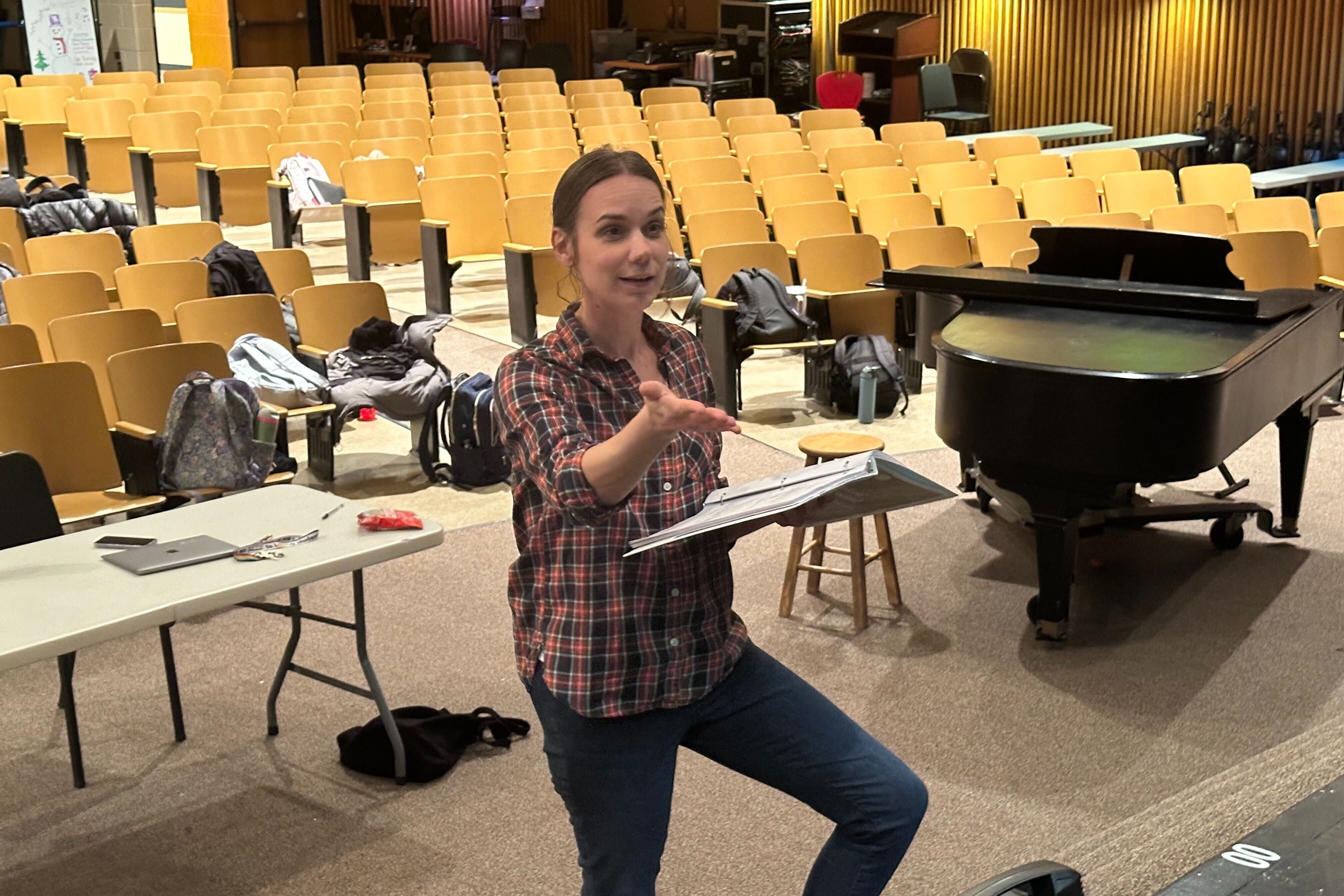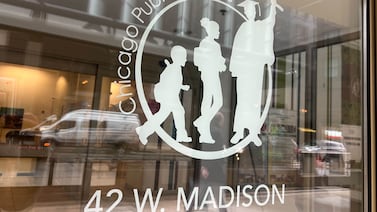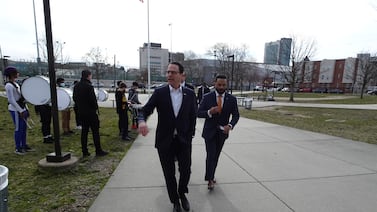Last month, Sally Wojcik, who teaches theater and creative writing at Benjamin Rush Arts Academy, was named by the Pennsylvania Department of Education as one of 12 finalists for state Teacher of the Year. Rush has just over 600 students who come mostly from its Northeast Philadelphia neighborhood, but as a criteria-based school, it also draws from all over the city. Some students commute up to two hours a day.
Students can choose from among various majors, including media arts, graphic arts, fine arts, theater, dance, and instrumental and vocal music. And once they choose their concentration, they take classes in that area every day and stay in that major for all four years. That means Wojcik is able to work with the same cohort of students for their entire high school careers and can plan a curriculum with that particular group in mind. “I was given full flexibility to design a curriculum that I thought was best for students,” said Wojcik, who chooses most of the plays her class will focus on, including some that may be controversial.
Rush has been her only teaching job, and she established its theater program there in 2009. She said she “was very lucky” when the director of Philadelphia Young Playwrights, who knew her from her work with the education outreach program of the Arden Theater, recommended her as a perfect fit for Rush, which was in the process of converting from a middle school to an arts-focused high school.
A summa cum laude graduate of Albright College, Wojcik has a master’s degree in English education (Pennsylvania does not offer teacher certification in theater) from Temple University, and also spent a semester at the prestigious National Theater Institute in Waterford, Connecticut. She spoke to Chalkbeat senior writer Dale Mezzacappa about how she approaches her “dream job” and why theater experience is important for high school students.
Why did you become a teacher?
I was a “theater kid” my whole life. That was always the thing that brought me the most joy and fulfillment when I was a high school student. And then I pursued it in college and when I finished college, I apprenticed at the Arden Theater Company in Philadelphia trying to figure out how I fit into the theater profession. I worked in Arden’s education department and realized that I really loved helping young people find their voice and figure out what kind of artists they wanted to be.
Tell me about your own experience in school and how that affects how you work today.
I was really lucky. I grew up in Western Massachusetts, and my high school had a longstanding relationship with Shakespeare & Company, which has an amazing program where they would pair their resident artists with schools, and would come to work with us on our own Shakespeare productions. I remember, as a student, being made to feel very much like a valued and important person, and I just loved being a part of a group that had this collective goal to tell a compelling story. All throughout high school I had these amazing teachers, one theater teacher in particular, who was also the journalism teacher, who inspired me to value words and language.
How do you teach theater? It can’t be just kids sitting in a classroom.
My approach is very holistic. Everybody knows what it means to be an actor because that’s what we are used to seeing, but my program purposely focuses also on directing, design, and playwriting. We actually do spend a bunch of time in the classroom sometimes because each of my units is tied to what I call an anchor text. We read, analyze, discuss, pull apart a text … then we break off so a student might do a scene study or create an original piece of playwriting based on inspiration within that play, or they might take on designing an aspect of that play.
What plays have you studied recently? And how do you choose them?
There are 15 to 16 plays over the course of four years. My goal is to make sure that every student at least once sees themselves represented in the plays I bring in. So it’s really important that they come from playwrights with diverse backgrounds that highlight diverse characters. We start at the very beginning … so there are a couple of Greeks, moving all the way up through contemporary plays. I try to bring in plays that have different kinds of conflicts, different kinds of themes, different kinds of structures or use of language. Every play has an engine, something that makes the play go, and it’s really important to bring in different kinds of engines so every student can get excited at some point.
What plays, specifically?
The ninth grade set curriculum is Antigone, A Raisin in the Sun, and The Glass Menagerie, three big canonical works. In 10th grade, it’s Medea and August Wilson’s The Piano Lesson, and I’m in the process of reworking what I want the third text to be. And in 11th grade, it’s How I Learned to Drive by Paula Vogel, BFE by Julia Cho, Intimate Apparel by Lynn Nottage, The Shape of Things by Neil LaBute, and then Hedda Gabler by Henrik Ibsen. The 12th grade is always whatever they chose as their senior play, then A Midsummer Night’s Dream, Stop Kiss by Diana Son, and 26 Miles by Philadelphia writer Quiara Alegria Hudes.
What kind of plays do the 12th graders choose?
We just finished a production of Elsewhere by Don Zolidis, which is a play that follows four teenagers into a kind of shared dream landscape where they have to navigate some childhood issues to realize what they want to become as adults. Last year, they did a murder mystery, and the year before that they did Tinkerbell, which is an adaptation of the Peter Pan story. Sometimes, I have veto power, but mostly, they’re chosen by students.
Rush focuses on the arts, but in other schools, arts tend to be the first thing to go when the budget gets tight. Do you think all students should be exposed to theater?
I think it is every student’s right to have access to high-quality arts education in the same way they have the right to a high-quality core curriculum. The thing I love about theater is that it’s about stories, and stories are the most fundamental way for humans to connect. Allowing students to explore other people’s stories gives them a pathway to explore and explain their own.
Is there a particular moment or production that you remember as being pivotal for you? Something that made you think, this is why I do this?
Well, lots of students have expressed to me that theater is the thing they come to school for. But there was a moment, I think, when my students changed me. It was maybe seven years ago, the senior production was Lillian Hellman’s The Children’s Hour, which deals with two female teachers who run a boarding school and had been accused by a student of being involved in a romantic relationship. The student was mad and wanted to get back at them, but what she didn’t know was that one of them really did have deep feelings for the other. And the student actors playing the teachers were just both so good. I was sitting in the audience when I thought, they are both, at age 17 or 18, better actors than I ever was. And it was this beautiful moment where I felt like they had surpassed my own skill level, and I was learning from them. My program is designed for students to become really independent of me. I provide all the scaffolding and the structure, so, then, they can do it on their own.
What is the best advice you ever got as a teacher?
When I first started working in Philadelphia, I took a workshop with Young Playwrights, and there was a speaker who said that our job is to help students find their voices, and not our voice through them. And that has been something that has always resonated in the back of my head. I am always looking for ways to center students in the work that they are creating, and to help them learn to trust themselves and their stories rather than looking to me for validation of their stories.
Have you ever had a parent or administrator try to censor what you were teaching?
It’s funny because I’m always waiting for that call. I’ve had parents ask questions, good questions, but I’ve never had a parent say their kid can’t read that, or can’t be a part of it. The play How I Learned to Drive [about a sexually abusive relationship between a teen and a trusted adult], every year I have students come to me afterward and say that the play changed their life, sometimes because they’ve been through something similar, and having the opportunity to process that through somebody else’s perspective has freed them. And I feel very backed up by the School District of Philadelphia. I feel really grateful for the progressiveness of the district I work in.
Did you ever aspire to be an actor?
No, this is actually my dream job. I was not ever very in love with the lifestyle of a professional artist [moving] from gig to gig. Part of what I love about being a theater teacher is that I get to really tuck in with the students and work with them over a long period of time. I love teenagers; I love this point of personal development when they are figuring out who and how they want to be. Teaching, for me, wasn’t a default. It was an active choice.
Dale Mezzacappa is a senior writer for Chalkbeat Philadelphia, where she covers K-12 schools and early childhood education in Philadelphia. Contact Dale at dmezzacappa@chalkbeat.org.








